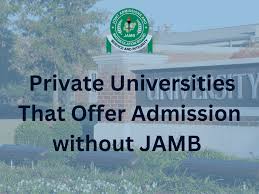By Milcah Tanimu
The recent revelation regarding private university admissions in Nigeria sheds light on several important trends and challenges within the country’s higher education landscape. Over a span of six years, only 175,645 admissions were granted by 97 private universities, amidst a total of over 2.4 million admissions across Federal, State, and Private institutions. This disparity raises questions about the factors influencing the low subscription rates in private universities.
The acting Executive Secretary of the National Universities Commission, Chris Maiyaki, attributed this phenomenon to several factors, including cost, location, and academic reputation. Higher tuition fees, remote locations, and the struggle to establish academic credibility pose significant barriers to attracting students to private institutions.
Despite these challenges, the NUC has received over 270 fresh applications for new private universities, indicating ongoing interest and investment in private higher education. Figures show that a handful of private universities, such as Afe Babalola University, Al-qalam University, and Covenant University, have managed to enroll significant numbers of students, exceeding 10,000 admissions each.
However, the overall low subscription rates in private universities underscore deeper issues related to affordability and perceived quality. Ayodamola Oluwatoyin, an education analyst, points out that affordability and quality concerns deter many prospective students from considering private institutions. In a country where economic constraints are prevalent, the ability to afford tuition fees becomes a crucial determinant of university choice.
Moreover, the perceived reputation and recognition of private universities play a significant role in students’ decision-making processes. Newer institutions often struggle to establish credibility and may face skepticism from prospective students and parents.
As Nigeria seeks to expand access to higher education and enhance the quality of its academic institutions, addressing the challenges faced by private universities is paramount. Initiatives aimed at improving affordability, enhancing academic standards, and bolstering institutional reputations could contribute to a more balanced and equitable higher education landscape in the country.

